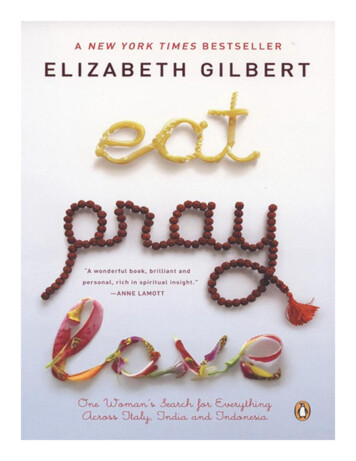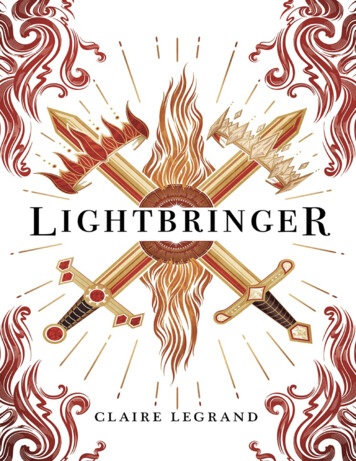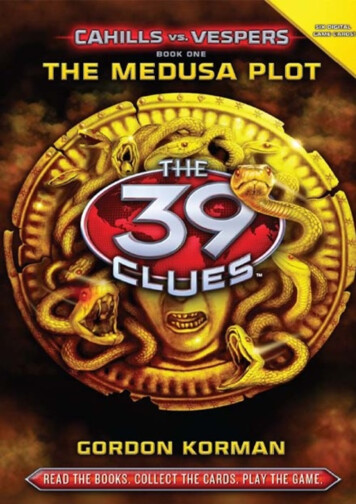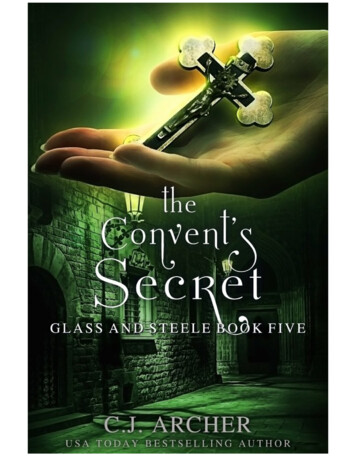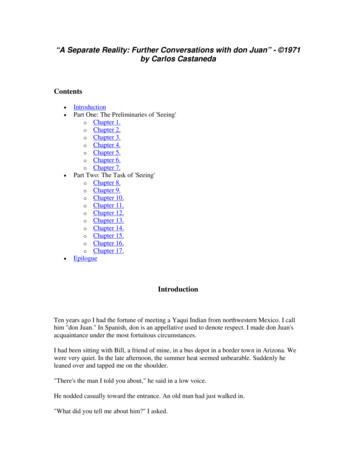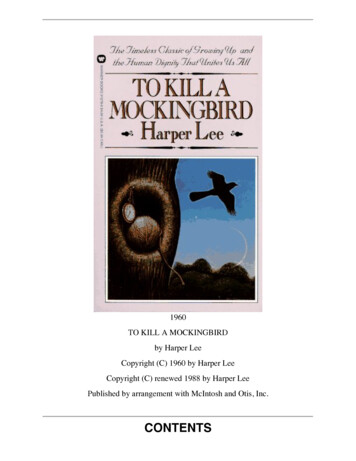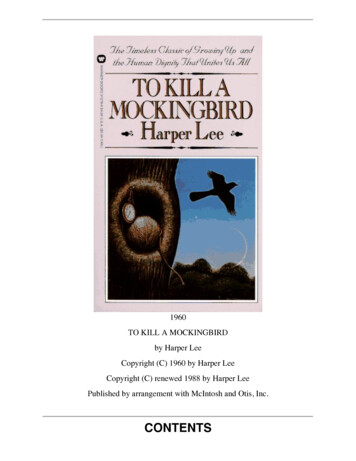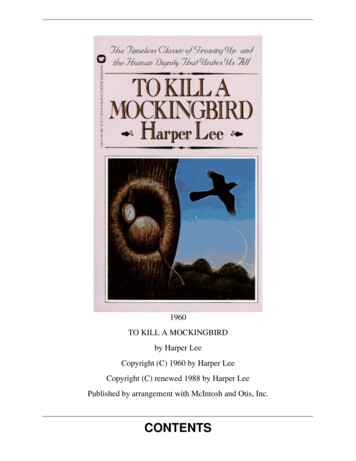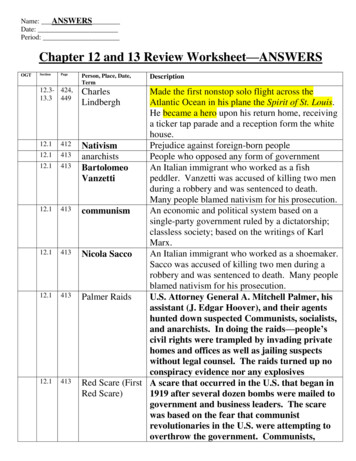
Transcription
Name: ANSWERSDate:Period:Chapter 12 and 13 Review Worksheet—ANSWERSOGTSectionPage12.3- 424,13.3 13Person, Place, Date,TermCharlesLindberghDescriptionMade the first nonstop solo flight across theAtlantic Ocean in his plane the Spirit of St. Louis.He became a hero upon his return home, receivinga ticker tap parade and a reception form the whitehouse.Prejudice against foreign-born peopleNativismanarchistsPeople who opposed any form of governmentAn Italian immigrant who worked as a fishBartolomeopeddler. Vanzetti was accused of killing two menVanzettiduring a robbery and was sentenced to death.Many people blamed nativism for his prosecution.An economic and political system based on acommunismsingle-party government ruled by a dictatorship;classless society; based on the writings of KarlMarx.An Italian immigrant who worked as a shoemaker.Nicola SaccoSacco was accused of killing two men during arobbery and was sentenced to death. Many peopleblamed nativism for his prosecution.Palmer RaidsU.S. Attorney General A. Mitchell Palmer, hisassistant (J. Edgar Hoover), and their agentshunted down suspected Communists, socialists,and anarchists. In doing the raids—people’scivil rights were trampled by invading privatehomes and offices as well as jailing suspectswithout legal counsel. The raids turned up noconspiracy evidence nor any explosivesRed Scare (First A scare that occurred in the U.S. that began inRed Scare)1919 after several dozen bombs were mailed togovernment and business leaders. The scarewas based on the fear that communistrevolutionaries in the U.S. were attempting tooverthrow the government. Communists,
12.1413Sacco andVanzetti12.141312.141312.141412.1414The trial ofSacco andVanzetti cameto symbolizeWhy didAttorneyGeneral A.Mitchell Palmerlaunch a seriesof raids againstsuspectedCommunists?“Keep Americafor Americans”According toVanzetti, whatwere thereasons for hisimprisonment?because of their red flag, were nicknamed the―Reds‖Two Italian immigrants accused of a robberyand the killing of two men, a factory paymasterand his guard, during robbery in SouthBraintree, Massachusetts. Witnesses said theysaw the criminals who appeared to be Italian.The two men asserted their innocence and hadalibis. The evidence against them wascircumstantial. Many thought they neverreceived a fair trial due to the prejudices thatexisted in the U.S.—the judge even madeprejudice remarks. The men were found guiltyand sentenced to death—they died in theelectric chair on August 23, 1927.Mistrust for immigrants and radicals—fell rightinto the hands of nativists.He believed that a Communist revolution wasimminent in the United States, and he neededan issue on which to campaign for the 1920Democratic presidential nomination.The slogan that many nativists used in their effortsfor anti-immigration legislation.Because he was a political radical and aforeigner:“In all my life I have never stole, neverkilled, never spilled blood . . . . We weretried during a time . . . when there washysteria of resentment and hate against thepeople of our principles, against theforeigner. . . . I am suffering because I ama radical and indeed I am a radical; I have2
12.1415Bigot12.141512.1415Election of1924,Democratsdivided overwhat twoissues?EmergencyQuota Act12.1415Explain thereasons for andthe outcome ofthe EmergencyQuota Act andthe NationalOrigins Act.12.1415Ku Klux Klansuffered because I was an Italian andindeed I am Italian. . . . If you couldexecute me two times, and if I could bereborn two other times, I would live againto do what I have done already.”A person who is intolerant of any creed, race,religion, or political belief that differs from hisown.Ku Klux Klan and ProhibitionLegislation that severely cut the number ofimmigrants admitted to the United States—number was based on the quota system. Thelaw also prohibited Japanese immigration.During and after World War I, a feeling againstimmigrants existed. As a result, Congress passedthe Emergency Quota Act in 1921. This actseverely cut the number of people admitted to theUnited States by limiting the total number ofpeople admitted in any national group to only 3percent of the total number already living in theUnited States in 1910. In 1924, the NationalOrigins Act made restriction a permanent policyand further restricted immigration by setting thequota at 2 percent of those living in the country in1890. It also provided that after 1927 only 150,000 immigrants would be admitted annually, theirnationalities apportioned on the basis of the 1920census. This meant that most immigrants wouldbe form northern and western Europe. Theintention of the National Origins Act was clearlyto discriminate against certain nationalities andraces.Secret society opposed to African Americans,3
12.141512.141512.1415Jews, Catholics, and ―foreign ideas.‖ The KKKgained new momentum during the 1920s asthey reached 4.5 million ―white male person,native-born gentile citizens.‖ The Klandominated state politics in many states but theorganizations criminal activity eventually led adecrease in their power. Birth of a Nation wasthe first movie—it was about the KKK andportrayed them as heroes which causedmembership to go up.NationalLaw that made immigration restriction aOrigins Actpermanent policy; Made the emergency quota actpermanent and set a new maximum number—2percent of the number of its nationals living in theUnited States in 1890. This discriminated againstpeople from eastern and southern Europe sincethey did not come to the U.S. in large numbersuntil after 1890.quota systemSystem established the maximum number ofpeople who could enter the United States fromeach foreign country—the number was basedon the percentage of current Americans fromthat particular country. The goal of the quotasystem was to cut the number of immigrantsentering the United States.What was theThe quota system was established to limit thequota system of number of immigrants that were allowed to enterthe 1920s?the United States per year. It was established toExplain why it limit the number of immigrants that were allowedwas established, to enter the United States per year. It waswho it affected, established because of pressure from nativists andand severalbecause the number of U.S. immigrants rose byresults of the600 percent in 3 years. The policy mostly affectedpolicy.immigrants from eastern and southern Europe,particularly Roman Catholics and Jews. It did notaffect Canadian and Mexican immigration. As aresult of the quota system, immigration fromrestricted countries fell dramatically. Japanese4
12.141512.141512.141712.1417—N/Aimmigrants were also restricted by the quotasystem, adding further stress to the relationshipbetween the United States and Japan.What were the To keep America under the control of whitemain goals ofnative-born males; to get rid of other groups,the Ku Kluxincluding Roman Catholics, Jews, and foreignKlan at thisborn people, and radicals; to oppose uniontime?organizers; to help enforce prohibition.Why did the Ku In the 1920s, many American were frightened ofKlux Klanradical political thought or of anything that mightflourish in thechange their way of life. They resented1920s? Whatimmigrants for making employment more difficultdoes this tellfor native-born Americans. The Russianyou aboutrevolution made many Americans nervous. Manypeople’speople resented the advances organized labor hadbehavior inmade and saw unions as benefiting onlytroublesomeimmigrant groups and the urban working poor.times?The fact that the Ku Klux Klan flourishedindicates that people seek someone to blame forsituations that make them feel insecure. Whenseeking a scapegoat, the easiest victim is one whois different in some way from the dormant group.Fear can result in serious intolerance, and thefearful will grasp at anything that makes them feelsafer.Compare theNeither strike was successful: The police lostresults of thetheir jobs, and the steel workers won nothing.Boston PoliceStrike and theSteel Strike of1919.Seattle General Seattle shipyard workers wanted higher wages andStrikeshorter hours. When demands were not met,35,000 shipyard workers walked off the docks andwere soon joined by 110 other local unionsmaking a grand total of some 60,000 workers.The strike ended, because of public pressure, afterfive days with the workers not winning any of5
12.1417—N/A12.141712.1417their demands.TechnologicalJob loss when occupations become obsoleteUnemployment because of technological advancements that allowfor less workers or actual machines doing thejob(s) that humans once performed.The 1919The Boston Police Department (BPD) wantedBoston Policepay raises (had not received one since prior toStrikeWWI), wanted more vacation days, and cityprovided uniforms. The BPD was notpermitted to unionize but when several officerswere fired when they asked the city for thesethings—1,117 BPD officers unionized and wenton strike. Massachusetts governor CalvinCoolidge intervened to quash further chaos bysending in the National Guard. Coolidgeannounced that the police did not have theright to strike against the public safety—―There is no right to strike against the publicsafety by anybody, anywhere, anytime.‖ Thestrike was broken but Coolidge hired entirelynew replacement police officers—many ofwhom were returning servicemen from WorldWar I –and the former officers were refused reentry into the department. Ironically, the newofficers hired in the wake of the strike receivedhigher salaries, more vacation days, and cityprovided uniforms -- the very demands theoriginal strikers were requesting. The BPDstrike set a precedent for further movements tostymie police unionization around the country.Coolidge's intervention in the strike broughthim national fame which, in turn, led to hisnomination as Harding's running mate forVice-President in the 1920 presidential election.The Steel Strike Workers in the steel mills wanted shorter hoursof 1919 (Theand better wages as well as their unionSteel Millrecognized. In September 1919, the U.S. SteelStrike)Corporation refused to meet with union6
12.141712.1418—N/A41812.1Why didCongress makechanges inimmigrationlaws during the1920s?CapperVolstead ActExplain therepresentatives and over 300,000 workers wenton strike in response. The steel company hiredstrikebreakers (or scabs as they were called) toreplace the workers and they used force to getthem in. Strikers were beaten by police, federaltroops, and the National Guard when theyattempted to stop the strikebreakers. Thecompany then publicly (although not true)linked the union with communists whichfurther eroded the standing of the union in thepublic eye. President Wilson finally made aplea to the combative negotiators and the strikeended in January 1920. The steel companyincreased wages but workers remain without aunion.Impact:Almost no union organizing in the steelindustry occurred in the next 15 years.Advances in technology, such as thedevelopment of the widestrip continuoussheet mill, made most of the skilled jobs insteelmaking obsolete (technologicalunemployment).When the AA considered calling anational strike in 1929 to demand that thenew technology be rejected, nearly everyAA affiliate returned its charter to theinternational rather than obey the strikeorder.The number of immigrants increased sharply, andmany Americans did not want people from foreigncountries entering the nation, since some of themwere anarchists and socialists and some werebelieved to be Communists.Legislation that made farm cooperatives free ofantitrust lawsThe average income of farmers was less than one7
problems offarmers duringthe 1920s andthe response ofthe federalgovernment tothese problems.12.1418Farm Bloc12.1418Farmers12.1418John L. Lewisthird of the average income for the rest of thecountry. Technological advances led to anincrease in production which caused a decreasedin farm prices even while farmers’ costs increased.With the United States switching from a debtor toa creditor nation, the foreign market foragricultural products dwindled. The domesticmarket also diminished as the use of new fabricslessened the demand for cotton. Many farmershad borrowed heavily to buy more land, and theonly way to pay off the debt was to raise morecrops. More crops, however, resulted in untellablesurpluses which in turn led to low prices and aheavier debt load. Some legislation was passedthat favored farmers, but none of the laws dealtwith the major problem of surpluses that could notbe sold. A bill that would have allowed thefederal government to buy crop surpluses and sellthem abroad passed Congress twice, but wasvetoed both times by President Coolidge.Congressional organization formed to helpfarmersThey did not enjoy the same prosperity thateveryone else enjoyed in the 1920s. The majorproblem was surplus. During the war, mostfarmers had increased their production for the wardemand since they were providing America andthe Allied Powers with their food needs. After thewar, most countries started producing their ownfood or could not afford to buy from the U.S.anymore. Yet farmers continued production at thesame rate which resulted in a huge surplus whichdrove down demand and prices.Lewis always fought for workers rights. When hebecame the head of the United Mine Workers ofAmerica he led a strike for higher wages andshorter work days. When a court order ended thestrike, Lewis called the strike over but secretly8
12.141812.141812.141812.1418McNaryHaugen BillPrice-supportsurged the workers to remain on strike. After anarbitrator ended the strike and the workers gottheir pay raise, Lewis became a national hero. Hisgreatest accomplishment was organizing theCongress of Industrial Organizations (CIO) forworkers in mass-production industries(automobiles, rubber, etc.) which would latercombine with the AFL to form the largest union.Proposed that the government have price-supportsGovernment would buy surplus crops atguaranteed prices and sell them on the withworld marketUnionWhen employers are providing workers withmembership and fair—welfare capitalism. Also:power declinedmuch of the work force consisted ofin the 1920simmigrants willing to work in poor(membershipconditions,dropped from 5since immigrants spoke a multitude ofmillion to 3.5languages, unions had difficulty organizingmillion). Why?themfarmers who had migrated to cities to findfactory jobs were used to relying onthemselvesmost unions excluded African AmericansUnited MineIn 1919, the United Mine Workers ofWorkers Strike America—since 1890—appointed John L.(Coal Miners’Lewis as their new leader. Under Lewis’sStrike)leadership, mine workers went on strikedemanding higher wages and shorterworkdays. Attorney General Palmer got acourt order sending the miners back to work(not having coal endangered U.S. economy).Lewis said it was over but secretly urged thestrike to continue. After court order, minersstayed on strike for another month untilPresident Wilson appointed an arbitrator toput an end to it. The miners got a pay increase9
12.1418—N/AWelfarecapitalism12.241912.2419―a return tonormalcy‖Charles 012.2420Warren G.HardingWashingtonConferenceand John L. Lewis became a national laborhero.System in which an employer provides stock,profit-sharing, and benefits such as medicalinsurance to employeesHarding’s oft-used campaign slogan that seemedto express what Americans wantedThe Secretary of State who led the WashingtonConference—a conference of major worldpowers that attempted to look at some postWWI problems: arms control, war debts, adreconstruction of war-torn countries.US, Great Britain, Japan, France, and Italy agreedto freeze their navies at 1921 levels along w/several other provisionsUS, Great Britain, France, and Japan agreed torespect one another’s Pacific holdings.Put the Open Door policy into the form of a treaty,US, Great Britain, Japan, France, Italy, Belgium,China, the Netherlands, and Portugal agreed topreserve equal commercial rights in China and torefrain from “taking advantage of conditions inChina to seek special rights or privilege.”Republican candidate elected President in 1920An eight nation conference in Washington, D.C.conference of major world powers (except Russiab/c they were Communist) that attempted to lookat some post-WWI problems: arms control, wardebts, ad reconstruction of war-torn countries. TheFour-Power, Five-Power, and Nine-Power Treatytreaties were signed as a result.Andrew Mellon One of Harding’s Cabinet members that didgood—Secretary of treasury between 1921 and1932 that set out to set about drastically cuttingtaxes and reducing the nation debtCharles G.A U.S banker who negotiated the Dawes Plan.Dawes10
12.2420Dawes andPact12.2420Ohio gang12.2420What doHarding’sGermany was beginning to default on theirpayments and printed more money to be able tomake their payments—this resulted in massiveinflation (citizens actually had to wheel inbundles of money just to buy a loaf of bread).An international committee headed by CharlesDawes (American Banker) came up with aplan—the Dawes Plan:1. Provide a 2.5 billion loan from Americanbanks to stabilize German currency2. Set up more realistic schedule forreparations paymentsIn the end, the U.S. arranged to be repaid withits own money.Adopted by the U.S. in 1922, it raised taxes onU.S. imports to 60 percent00the highest level ever.The tariff was put in place becauseAs a result of the war, Americans had twomain concerns. First, they wanted toensure economic self-sufficiency so that nofuture enemy could manipulate theAmerican economy. Second, manyindustries wanted to preserve the benefitsof the increased wartime demand. Thesespecial interests feared Europeancompetitors attempting economic recoverythrough increasing exports to America.Treaty that attempted to outlaw war—signed byfifteen countries. It was futile since it provided nomeans of enforcing.Harding’s poker-playing crony friends who weremostly from Ohio. Harding appointed many ofthem to positions in his administration. The Ohiogang was plagued by scandal as they sought to usetheir connections to the president to enrichthemselves at the public’s expense.That although he made some good appointments,his appointment of cronies from his home state11
appointmentsindicate abouthis judgment?What were thereasonsEuropeancountries werenot paying theirwar debt?Albert B. Fallshowed poor judgment.12.242012.242112.2421Charles R.Forbes12.2421ColonelThomas W.Miller12.242112.242112.2421How did thescandals of theHardingadministrationhurt the countryeconomically?Teapot DomeAlbert B. Fall, secretary of the interior, secretlyScandalleased oil lands to private companies. Inreturn, he received bribes totaling more than 400,000. One of the locations was TeapotDome, Wyoming.Warren G.Haring promised the American people a “return toHarding’snormalcy” after World War I. This appealed to apresidency was public that was trying to recover form a war thatplagued byhad drastically changed American life. One ofTheir economies had been weakened in the war;they were unable to raise money because U.S.exports were limited by high tariffs; Germanyfailed to pay them expected reparations.Harding’s secretary of the interior who went tojail for fraud—Teapot Dome ScandalWas the head of the Veterans Bureau and wascaught illegally selling government and hospitalsupplies to private companies. During his trial,Forbes attempted to implicate Treasury SecretaryAndrew Mellon in his actions, however Mellon'swell-known standards of ethics trumped Forbesclaim when he failed to produce any evidence toback his claims.Was the head of Alien Property and was caughttaking bribes. He served 18 months in prison. Hewas paroled in 1929 and pardoned by UnitedStates President Herbert Hoover in 1933.The government lost revenue when veterans’hospital overcharged it; in the Teapot Domescandal, public oil reserves were leaded for privategain.12
scandal, and itwas laterregarded asunsuccessful.Explain whyPresidentHarding waspopular with theAmericanpublic despitethese facts.Henry Ford12.342212.3423—N/A423—N/A“Tin Lizzie”12.3423—N/AAssess theeffects of theautomobile onlife in theUnited States.12.3423Route 6612.3Assembly LineHarding’s first priorities as president was workingwith other world powers to agree on peace. Ofcourse, the idea of peace very much appealed topost-war Americans. Also, Harding “looked like”a president, and the American people saw him as a“good-natured” man. He died just as the scandalsof his administration were coming to light,possibly saving him from public ridicule.Business leader who used the assembly line meansof production for automobiles.Henry Ford’s Model T automobileMethod of manufacturing in which production isdivided into simple tasks; made popular andrefined by Henry Ford (considered his greatestachievement)Ford’s use of mass production and low pricesproduced a mass market for automobiles. Theautomobile stimulated some small businesses suchas garages, gas stations, diners, and tourist homes.Tractors replaced draft animals on farms and ruralareas were no longer isolated. Workers couldcommute to their jobs and people, in general,became more mobile.U.S. Route 66, (also known as Route 66, TheMain Street of America, The Mother Road and theWill Rogers Highway) was a highway in the U.S.Highway system. One of the original federalroutes, US 66 was established on October 11th,1926, though signs did not go up until thefollowing year. It originally ran from Chicago,Illinois through Missouri, Kansas, Oklahoma,Texas, New Mexico, Arizona and Californiabefore ending at Los Angeles for a total of 2,448miles.13
12.3423What was theimpact of theautomobile?12.3424Amelia Earhart12.342412.342412.3424How did thewidespread useof theautomobileaffect theenvironmentand the lives ofAmericans?Spirit of St.LouisUrban sprawl12.3425—N/A12.342512.342512.3425Roads were paved, and shopping centers and otherservices for cars were built; people commuted towork, and urban sprawl developed; regionaldifferences diminished.Amelia Earhart is the first woman to fly soloacross the Atlantic.It changed the American landscape through theconstruction of paved roads. It liberated theisolated rural family, and it allowed workers tolive miles from their jobs.Small plane that Charles Lindbergh used to flynonstop across the AtlanticThe unplanned and uncontrolled spreading ofcities into surrounding regionsAdvertisersAppealed to their desires, used psychologicaltalked lessadvertising—i.e.: one Listerine ad aimed toabout the facts convince women readers who have difficultof a product and time finding a husband with bad breath.appealed moreto the ofconsumers?How did the use It transformed the nation. Factories usedof electricityelectricity to run their machines. Electricity couldaffectnow be transmitted to the countryside. Well-to-doAmericans’families had electric refrigeration, cooking ranges,lifestyle?and toasters, vacuums, electric irons, fans, etc.).What were three Excess money (rationing and lack of productsmainduring the war), new products, and installmentcomponents that plans.drove theconsumerismduring the1920s?Why wereAds made people think they need certain products.14
advertisementsso successful inthe 1920s? DOthey serve thesame purposetoday? Explainyour answer.12.342612.342712.342713.143413.1435They used psychological techniques to appeal topeople’s vanities and fears. There were many newproducts, and they were marketed in clever ways.People were tired of the deprivation they hadfaced during the war and were eager to indulgethemselves. Ads today are still used to enticepeople to buy new products by appealing to theirvanities and fears. They still tempt to create asense of need for products that are in many cases,unnecessary.Installment plan Allowed consumers to buy goods over anextended period of time—allowed consumers topay a small amount of money down and thenpay the rest monthly (credit) led to increase inconsumption (do not have to pay at time ofpurchase).How do youthink thechanges inspending willaffect theeconomy?What were themain advantageanddisadvantage ofbuying oncredit?CalvinCoolidgeHow did small-The economy may falter when consumers areunable to meet their credit obligations.A: People could buy goods they could nototherwise afford.D: People could go far into debt without realizing.Vice President who took over after Harding’sdeath. Known as Silent Cal, Coolidge’s stern,reserved natured contrasted with Harding’soutgoing personality. He was very much probusiness and generally opposed laws designed tohelp farmers or workers—he argued that suchlegislation limited private initiative and harmedthe economy.Small towns were bound by traditional morals and15
town life andcity life bitionBureauSpeak-easies13.1436Volstead Act13.1436What and whowas the drivingforce behindProhibition?13.1437Al Capone13.1437Bootleggers13.143713.1437—N/AHow didcriminals takeadvantage ofProhibition?Moonshiners13.1437close ties of family, friends, and religion. Citiesoffered varied perspectives and options because oftheir large, mixed population; cultural variety; andgreater tolerance of values and ideas.The era after the passage of the EighteenthAmendment which banned the manufacture,sale, and transportation of alcoholic beverages.Agency established to enforce the law against theselling of liquorIllegal Saloons—so called because when inside,one spoke quietly, or “easily” to avoid detection.Established the Prohibition Bureau in theTreasury Department.Movement led predominately by women(temperance movement) who believed alcohol ledto violence (domestic violence), unemployment(firing for alcohol related issues), and economichardships (spending money on liquor—i.e.Saloons allowing workers to have credit and thencashing pay checks at end of week, workers hadalready spent half their paychecks.An entrepreneur in the illegal business ofproducing and providing alcohol duringprohibition. Became a very powerful man, notonly in the underworld but also in legitimate worldincluding politics.People who illegally produced and/or transportedalcohol. Name comes from days when Georgiawas a colony and prohibited alcohol—people whohide their flask in the bootleg.Criminals broke the law by smuggling, as well asby making alcohol and selling it for profit.People who illegal produced alcohol in stills fromcorn and potatoes; an illegal profession that stillexists today (mostly in Appalachian America).Rumrunners/Shi Individuals who were hired to transport alcohol16
13.1437—N/A13.143713.143813.1438nerunnersWhat led to thestart ofNASCAR?Why do youthink theEighteenthAmendmentfailed toeliminatealcoholconsumption?Aimee SempleMcPhersonAmerican CivilLiberties Union(ACLU)from producers to saloons.Early race drivers were often involved inbootlegging. Some accounts say that they all were.That is how (at least most of them) afforded thefastest and therefore most expensive machines-with their excessive moonshine profits. They ranmoonshine down the twisty mountain roads topeople during alcohol prohibition. The runnerswould modify their cars in order to create a faster,more maneuverable vehicle to evade the police,and came to love the fast paced driving. When theU.S. alcohol prohibition was lifted in 1933, theowners of these first "racecars" watched theirprofitable businesses dry up. Since they had noreason to use them for "runnin' shine" anymoreand found themselves with time on their hands andlots of money, many wanted to race their cars forpride and money.The consumption of alcohol was a tradition part ofmany cultures; the government failed to providesufficient staff and resources to enforce the law;the means of manufacturing, selling, andtransporting liquor were many and could easily beconcealed.A leading fundamentalist preacher who presenteda more sophisticated image/Hollywoodshowmanship to preach—she was especially wellknown for healing the sick through prayerThe ACLU offered to defend any teacher whowould challenge the Tennessee law that made ita crime to teach evolution. The American CivilLiberties Union (ACLU) is a major Americannon-profit organization with headquarters inNew York City, whose stated mission is "todefend and preserve the individual rights andliberties guaranteed to every person in this17
13.1438Billy Sunday13.1438Fundamentalism13.1438John T. Scopes13.1438Scopes Trial(Monkey Trial)country by the Constitution and laws of theUnited States". Lawsuits brought by theACLU have been influential in the evolution ofU.S. constitutional law. The ACLU provideslegal assistance in cases in which it considerscivil liberties to be at risk.A leading fundamentalist preacher—A baseballlayer turned preacher who staged emotionalmeetings across the South—he was also verymuch against alcohol consumption.A protestant movement that argued thattraditional Christian doctrine should beaccepted without question—every word of theBible should be regarded as literally true.John Thomas Scopes, a teacher in Dayton,Tennessee at the age of 24, was charged on May25, 1925 with violating Tennessee's Butler Act,which prohibited the teaching of evolution inTennessee schools. He was in court in a caseknown as the Scopes Trial.The case centered around John Scopes, ascience teacher, who was accused of violating aTennessee law. The law forbade the teaching ofDarwin’s theory of evolution (a belief thathigher forms of life developed from lowerforms of life). Scopes' involvement in the socalled Monkey Trial came about after theAmerican Civil Liberties Union (ACLU)offered to defend any teacher who wouldchallenge the Tennessee law that made it acrime to teach evolution. A group ofbusinessmen in Dayton, Tennessee, led byengineer and ge
the United States per year. It was established to limit the number of immigrants that were allowed to enter the United States per year. It was established because of pressure from nativists and because the number of U.S. immigrants rose by 600 percent in 3 years. The policy mostly affected immigrants from eastern and southern Europe,

